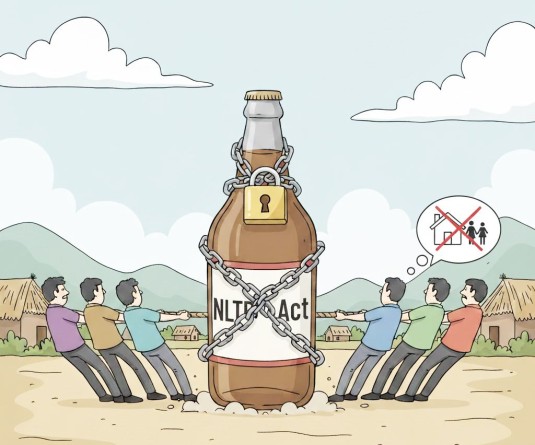
Our Correspondent
Kohima | September 22
Highlighting the potentials, strengths, gaps and requirements of Nagaland in particular and the north east in general, Chief Minister T.R. Zeliang today said the huge "gap of requirements” can only be filled with the pro-active and all out support and intervention of the Government of India “if our long cherished dream of transforming this region into a vibrant activity hub is to be achieved.”
Speaking at the two day Connect North East: North East Connectivity Summit here, he hoped that the summit will factor in all those aspects and come up with tangible and actionable recommendations for the overall development of the region with special thrust on road, rail and air connectivity as part of the “Act East Policy” of the Government of India.
He said North East region is endowed with rich forest and other natural resources, such as gas, oil, coal, lime stones etc. Tea is already a major export item from this region and has the potential to make India the largest exporter of coffee, cardamom, pepper and spices.
With the right intervention, the region has the capacity of turning into a premier rice bowl of the country under Agri-allied sector. It is also a bio-diversity hot spot with abundance of rare medicinal plants and herbs. Another strong point of the North-East region is its high literacy rate, which is higher than the national average. Therefore, we have a vast reservoir of educated and dynamic work force, fluent in English, progressive in outlook, and IT savvy.
CM said that Nagaland has in recent times emerged as an attractive tourist destination offering a unique blend of heritage and culture to the travellers in search of nature, music and cultural tourism.
“It also offers a great opportunity for eager adventure loving tourists by offering unique experience through Mountain Biking, Hiking, Trekking etc. The Government of Nagaland has been trying to bring in many new interventions in terms of policy and infrastructure. Development of tribal circuit of Peren - Kohima & Wokha under Swadesh Darshan Scheme of Ministry of Tourism is in progress,” he said.
Stating that Hornbill Festival has established itself as a major experiential event offering an unique lifetime experience to tourists and backpackers, he said the festival has brought about a sea change in the tourism sector in Nagaland.
“The true potential that lies dormant in Nagaland, like most of the other states in the North East, still remains to be fully explored. With its flora and fauna, hilly terrain and scenic beauty with around 16 major tribes and their distinctive cultural motifs and traditions, Nagaland can be an attractive tourist destination,” the chief minister said.
Another strength of Nagaland is its bio-diversity and natural resources. While the entire world is grappling with climate change and its fall out, Nagaland is safeguarded by its dense forests and bamboo reserves. Naga king chilly is one of the hottest chilly in the world while the best quality ginger and turmeric are grown in Nagaland through entirely organic process. These in themselves are the strengths which the culinary world craves for.
Stating that North Eastern Region is home to almost 60 percent of the country” bamboo reserves, chief minister said, “if scientifically exploited can give much boost to the economy of the region.”
With good connectivity, Nagaland can produce the best bamboo products at much cheaper prices due to the availability of raw material as well as manpower.
With plans for border townships and special economic zones, Nagaland can become the source of raw material and manpower for all bamboo based utility products, he said.
Another important area is the potential for energy and energy security. In Nagaland, due to rapid growth, the gap between demand and supply has widened. To meet this ever-increasing demand there is a need to explore potential sources from hydro, wind, solar etc.
He said Nagaland Forest Management Project for addressing jhum cultivation, climate change mitigation, protection and expansion of community conserved forest areas is being implemented in the State
He said that JICA project (Japanese International Cooperation Agency funded) project is being implemented in the state for addressing jhum cultivation, climate change mitigation, protection and expansion of community conserved forest areas.
The project is being implemented through Department of Forest Environment and climate change. This project is one of the largest foreign funded projects in the state under the forest and environment sector.
“The people of Nagaland are grateful to JICA group for the positive investments made thus far. I hope that the success story of such important concepts being taken up in the state will go a long way!” he said.
He said another important project LiTPiN - Livelihood Initiative through Piggery in Nagaland, under Veterinary department is implemented for piggery farming funded by NEIDA- North East Initiative Development Agency an initiative of TATA Trusts.
Expressing happiness over the presence of large numbers of corporates from India and the neighbouring countries at the ongoing Summit, he invited them to explore different investment opportunities in Nagaland.
On large number of delegation of businessmen from Myanmar, he said “With the Myanmar economy opening up, I believe the potential for expanding border trade is promising and huge. I will urge the Nagaland based business houses to interact with our friends from Myanmar and explore business opportunities.”


.jpg)


.jpg)
